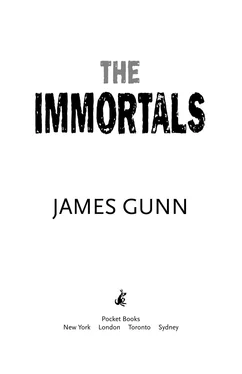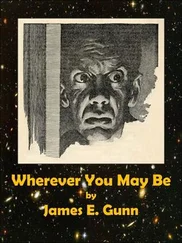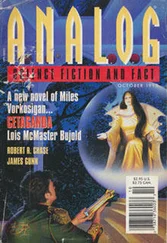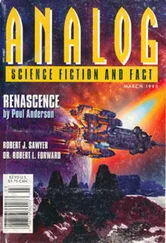“If you had been listening to the reports tonight, you would have learned that penicillin is worthless. When it was first introduced, immune bacterial strains averaged five percent. Now they are ninety-five percent and still climbing.”
Flowers thought of the money shoveled into research and production for antibiotics that developed more virulent bacterial strains for which newer and better antibiotics had to be discovered.
“How are we going to put a stop to it,” Flowers asked, “if we don’t punish them when we have a chance?”
The doctor smiled. “That’s what the PAC is for. We’ve refused to renew John Bone’s contract. That will bring him to his senses.” His face hardened. “At least, we thought it would until today.”
“What do you mean?” Flowers felt vaguely frightened.
“Until Bone released you this evening.”
Flowers stared at the five immobile faces with a feeling of frozen horror. “He didn’t release me. I escaped!”
“Now, Flowers, don’t waste our time with stuff like that,” the chairman said impatiently. “Men don’t escape from John Bone. And we have evidence—a film of the examination and treatment you gave him!”
“But I did,” Flowers broke in. “I used the supersonic anesthetizer and a hypodermic of neo-curare and I escaped—”
“Fantastic! After treating Bone—”
“I gave him sugar pills—”
“Just as bad. For Bone, they’re as effective as anything else.”
“Don’t you see why Bone sent you the films? If I’d really treated him, he’d have held these films over my head as a blackmail threat.”
The committee members exchanged glances. “We might be able to accept that,” the chairman said, “except that we have other evidence to prove that you hold the Profession and its ethics rather lightly.”
He switched on a recorder. Incredulously Flowers listened to his voice mouthing questions about medicine and fees and social problems. It had been skillfully edited. It was damning.
Hal, he thought, Hal, why did you do it?
But he knew why. Hal Mock was worried that he might not graduate. One less in the class was one more chance for Hal.
The chairman was speaking to him. “You will submit your resignation in the morning. As soon after that as possible, you will collect your personal effects and leave the Center. If you are ever discovered practicing medicine or treating the sick in any way…”
When it was finished, Flowers asked quietly, “What are you going to do with Doctor Russell Pearce?”
The chairman’s eyes narrowed, and then he turned to the doctor on his right. “Doctor Pearce?” he said. “Why, he disappeared thirty years ago, didn’t he? He must have died long ago. If he were alive, he’d be over one hundred and twenty-five…”
Flowers stopped listening. Something had snapped inside him like a carbon-steel scalpel, and he didn’t have to listen anymore. A man spends his life searching for the truth. If he’s lucky he learns before he dies that no one has it all. We have little pieces, each of us, Flowers thought. The danger was in assuming our fragment was the whole. Medicine could not be both political and irresponsible. Dr. Pearce could not be both hero and villain.
Flowers had finally found his way to the back of the statue and learned—in time—that half an ideal is worse than none at all. Father, he thought, you never got there. I’m sorry, Father.
He turned and walked out of the room. There was a phone in the courthouse lobby. He called his number and waited and then spoke briefly and urgently into the pickup. While the chauffeur guided the ambulance back toward the Medical Center, he fished around in the black bag for a couple of amphetamine pills and ate them like candy.
But his feeling of exhilaration and purpose began minutes before the stimulant hit him. It was all very well to be an integral part of a great social and ethical complex, but occasionally a man had to do his own thinking. And then, of course, the great social and ethical complex had to watch out for itself.
He wasn’t even disturbed to discover that he was being followed. He shook off the distant white jacket in the subway.
“Look,” he said to the pharmacist on duty, “it must get pretty boring here at night. Don’t you ever get an overwhelming yen for a cup of coffee?”
“I sure do.”
“Go ahead,” Flowers said. “I’ll watch the pharmacy.”
The pharmacist hesitated, torn between duty and desire. The decision to go resulted from a reluctance to appear timid before the medic.
As soon as he was gone, Flowers went straight through the pharmacy to the vault. The heavy door was ajar. In the farthest corner was a modest cardboard carton. Its contents had been estimated, conservatively, as worth $10,000,000. Flowers pocketed an ampule, hesitated, and removed the eleven others from their cotton nests—suddenly doubtful that the hospital should be trusted with them…
“Thanks for the break,” said the pharmacist gratefully a few minutes later.
Flowers waved carelessly as he left. “Any time.”
At the barred door of Experimental Ward, the guard stopped him. “I don’t see your name here anywhere,” he growled, his finger moving down the duty list.
“No wonder,” Flowers said, pointing his own finger. “They misspelled it. Powers instead of Flowers.”
It worked. Inside he walked quickly past the blood bank with its rows of living factories, the organ bank with its surgery and automatic heart machines… The part of the experimental rooms devoted to geriatrics was at the very end.
Dr. Pearce made scarcely a dent in the firm hospital mattress. Flowers shook him, but the smudged eyelids wouldn’t open. He filled a hypodermic from the ampule in his jacket pocket and injected it into a vein.
Flowers waited anxiously in the near darkness. Finally Dr. Pearce’s eyelids flickered. “Doctor Pearce,” he whispered, “this is the medic. Remember?” Pearce nodded, barely perceptibly. “I’m going to try to get you out of here, you and Leah. She’s here, too. Will you help?”
Pearce nodded again, stronger this time. Flowers brought the long cart beside the bed and lifted Pearce’s bone-light body onto it. He pulled a sheet up over Pearce’s face. “Here we go.”
He engaged the clutch and guided the cart back the way he had come, past the rooms with their burdens of human tragedy, through the door, past the startled guard. The guard acted as if he were going to say something, but he waited too long.
When they were entering the elevator, Pearce whispered in a dust-dry voice, “What was the shot, Medic?”
“Elixir vitae. Isn’t that justice?”
“Justice is hard to recognize when we see it so seldom.”
“When did you have your last shot?”
“Thirty years ago.”
So, Flowers thought, I was wrong about that, too. It wasn’t the elixir keeping the old man alive. “You said you’d give Leah your eyes. Did you mean it?”
“Of course. Can you do it?”
The years had desiccated the body, but they hadn’t dimmed the mind, Flowers thought. Pearce had realized instantly what Flowers meant. “I don’t know,” he admitted. “It’s a chance. I’ll have to do it all alone in haste. I could give her some from the bank, but she would hate it. With yours it would be different.”
“A gift of love,” Pearce whispered. “It can never be refused. It enriches him who gives and him who receives. That is how it should be done always, with love. Don’t tell her. Afterward she’ll understand, how it made me happy to give her what I could not give her as a father—the world of light…”
* * *
The duty office was vacant. Flowers ran his finger down the room list until he found Leah’s name. He found another cart, ran it silently into the room, and stopped beside the bed. “Leah?”
Читать дальше












